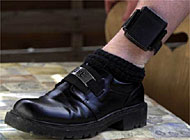Electronic gadget makes prison sentences more humane

One year after the introduction of electronic monitoring for people who otherwise would be sent to prison, the Swiss pilot project has been deemed a success.
The judicial authorities in canton Basel City, who pioneered electronic monitoring in Switzerland, presented the preliminary results of the scheme on Monday.
Six cantons have been experimenting with the penalty, which allows conventional sentences to be replaced by house arrests.
Over 230 offenders in the cantons of Basel City, Basel Country, Berne, Geneva, Vaud and Ticino have been participating in the pilot project. It was initiated by the government a year ago and will run at least until 2002.
Of the 234 delinquents who have taken part since September 1999, 193 successfully served their sentence.
“It has already become clear that electronic monitoring prevents delinquents from suffering the effects of prison life, which are so often counter-productive to reintroducing them into a social context,” said Hans Martin Tschudi, member of the cantonal government of Basel City.
Offenders who served their sentence in the form of electronic monitoring were able to keep their jobs and didn’t have to break with their social environment. Tschudi said: “As a result, they are better able to fulfil their obligations.”
Electronic monitoring uses a small electronic transmitter that the person wears around his or her ankle. A receiver in the apartment signals to security headquarters whether the person leaves the apartment outside the allowed time. This in effect means that he or she is under house arrest, except when at work.
Electronic monitoring can replace jail sentences of up to one year in the two Basel cantons and in canton Berne, and sentences of up to six months in Geneva. The method is also applied to offenders who serve longer jail terms, but only to alleviate their last year in prison.
According to Dominik Lehner of the Basel City justice department, twice as many “clients” had participated in the programme than was expected one year ago.
Electronic monitoring had been criticised from several sides before its introduction. For this reason, the Swiss government, which wants to introduce the practice nation-wide, agreed to the pilot scheme in 1999.
While right-wing circles slammed electronic monitoring for being a “soft” form of punishment, liberal circles feared that it would replace community work.
But it was clear that electronic monitoring was neither “soft”, nor did it compete with community work, Lehner told swissinfo.
Not being allowed to leave one’s home for up to an entire year was widely regarded as punishment, Lehner said. More crucially, “delinquents find it extremely difficult to deal with their delinquency in the confines of their own four walls. That’s punishment of the kind we want,” Lehner says.
The preliminary results also show that community work is still used as a form of punishment, and that it is only replaced by electronic monitoring if the latter is seen as more advantageous. Most electronically monitored offenders serve the sentence instead of going to prison or being in day release prison.
While other cantons participating in the scheme use more conventional ways of electronic monitoring, the two Basel cantons draw directly from experiences in the Netherlands, where electronic monitoring is accompanied by intensive monitoring by social workers. “Clients” are visited at least twice weekly by their social workers.
“While delinquents are dealing with prison guards and social workers in prison, in electronic monitoring the same person does the counselling and the controlling,” says Lehner. The effect is helpful because offenders are faced more squarely with their offence, Lehner said.
The public also benefits from the scheme. Apart from integrating delinquents more easily into society, it is estimated that electronic monitoring – including intensive social work as well as the technical equipment needed – saves about 50 per cent of the costs of a conventional prison term.
According to Lehner, a crucial element of electronic monitoring is choice. “It would be wrong, and reminiscent of a ‘Big Brother’ attitude, if the state were to force itself into people’s homes. Our clients must opt for electronic monitoring out of their own will.”
While of the 234 terms under electronic monitoring 193 were successfully terminated, the punishment was aborted in seven cases. Cases where delinquents re-offended were too small in number to be of statistical value.
The pilot projects will continue until 2002, when the participating cantons will submit a final report to the federal authorities.
by Markus Haefliger

In compliance with the JTI standards
More: SWI swissinfo.ch certified by the Journalism Trust Initiative
You can find an overview of ongoing debates with our journalists here . Please join us!
If you want to start a conversation about a topic raised in this article or want to report factual errors, email us at english@swissinfo.ch.